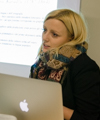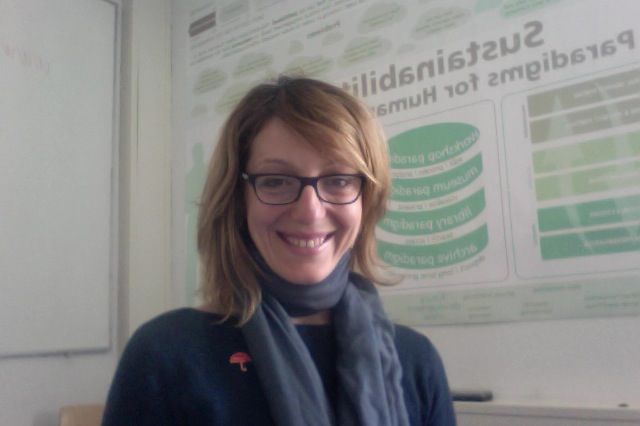Studying at the University of Verona
Here you can find information on the organisational aspects of the Programme, lecture timetables, learning activities and useful contact details for your time at the University, from enrolment to graduation.
Academic calendar
The academic calendar shows the deadlines and scheduled events that are relevant to students, teaching and technical-administrative staff of the University. Public holidays and University closures are also indicated. The academic year normally begins on 1 October each year and ends on 30 September of the following year.
Course calendar
The Academic Calendar sets out the degree programme lecture and exam timetables, as well as the relevant university closure dates..
| Period | From | To |
|---|---|---|
| I semestre | Oct 1, 2015 | Jan 9, 2016 |
| II semestre | Feb 22, 2016 | May 31, 2016 |
| Session | From | To |
|---|---|---|
| Appelli d'esame LINGUE - sessione invernale | Jan 11, 2016 | Feb 20, 2016 |
| Appelli d'esame LINGUE - sessione estiva | Jun 3, 2016 | Jul 29, 2016 |
| Appelli d'esame LINGUE - sessione autunnale | Aug 29, 2016 | Sep 29, 2016 |
| Session | From | To |
|---|---|---|
| TESI DI LAUREA - LINGUE | Nov 18, 2015 | Nov 20, 2015 |
| TESI DI LAUREA - LINGUE | Mar 30, 2016 | Apr 1, 2016 |
| TESI DI LAUREA - LINGUE E LL.SS | Jul 6, 2016 | Jul 8, 2016 |
| TESI DI LAUREA - LINGUE E LL.SS | Nov 23, 2016 | Nov 25, 2016 |
| Period | From | To |
|---|---|---|
| FESTA DELL'IMMACOLATA | Dec 8, 2015 | Dec 8, 2015 |
| VACANZE DI NATALE | Dec 23, 2015 | Jan 6, 2016 |
| Vancanze di Pasqua | Mar 24, 2016 | Mar 29, 2016 |
| FESTA DELLA LIBERAZIONE | Apr 25, 2016 | Apr 25, 2016 |
| FESTA DEI LAVORATORI | May 1, 2016 | May 1, 2016 |
| FESTA DEL SANTO PATRONO SAN ZENO | May 21, 2016 | May 21, 2016 |
| FESTA DELLA REPUBBLICA | Jun 2, 2016 | Jun 2, 2016 |
| Vacanze estive | Aug 8, 2016 | Aug 15, 2016 |
Exam calendar
Exam dates and rounds are managed by the relevant Foreign Languages and Literatures Teaching and Student Services Unit.
To view all the exam sessions available, please use the Exam dashboard on ESSE3.
If you forgot your login details or have problems logging in, please contact the relevant IT HelpDesk, or check the login details recovery web page.
Academic staff
 alessandro.bigardi@univr.it
alessandro.bigardi@univr.it

Bradas Marija
 marija.bradas@univr.it
marija.bradas@univr.it
 paolamaria.caleffi@univr.it
paolamaria.caleffi@univr.it
 veronica.gobbato@univr.it
veronica.gobbato@univr.it
 tiziana.mancinelli@univr.it
tiziana.mancinelli@univr.it
 sara.paolini@univr.it
sara.paolini@univr.it
 fabioantonio.scrignoli@univr.it
fabioantonio.scrignoli@univr.it
Study Plan
The Study Plan includes all modules, teaching and learning activities that each student will need to undertake during their time at the University.
Please select your Study Plan based on your enrollment year.
1° Year
| Modules | Credits | TAF | SSD |
|---|
1st foreign language2nd foreign language1st foreign literature2nd foreign literature2° Year activated in the A.Y. 2016/2017
| Modules | Credits | TAF | SSD |
|---|
2nd foreign literature1st foreign literature1st foreign language2nd foreign languageOne course to be chosen among the following3° Year activated in the A.Y. 2017/2018
| Modules | Credits | TAF | SSD |
|---|
2nd foreign language1st foreign languagePhilology of the first or second language| Modules | Credits | TAF | SSD |
|---|
1st foreign language2nd foreign language1st foreign literature2nd foreign literature| Modules | Credits | TAF | SSD |
|---|
2nd foreign literature1st foreign literature1st foreign language2nd foreign languageOne course to be chosen among the following| Modules | Credits | TAF | SSD |
|---|
2nd foreign language1st foreign languagePhilology of the first or second language| Modules | Credits | TAF | SSD |
|---|
Legend | Type of training activity (TTA)
TAF (Type of Educational Activity) All courses and activities are classified into different types of educational activities, indicated by a letter.
Introduction to Germanic Philology (2017/2018)
Teaching code
4S003493
Teacher
Coordinator
Credits
6
Language
Italian
Scientific Disciplinary Sector (SSD)
L-FIL-LET/15 - GERMANIC PHILOLOGY
Period
Semester 1 dal Oct 2, 2017 al Jan 20, 2018.
Learning outcomes
The course aims at providing students with conceptual, methodological and cultural basics, which are necessary to analyse and intepret Germanic linguisitic and literary traditions, including subject areas like historical-linguistics, paleography, codicology, textual criticism, history and culture related to the discipline.
The course aims also at providing students with an understanding of the main multidisciplinary aspects as well as at fostering the acquisition of the correct and appropriate vocabulary for this specific purpose.
Students will be enabled to gain knowledge about the main interdisciplinary aspects connected to Germanic Philology (historical linguistics, textual criticism, book history and Germanic antiquities).
The course will be divided into 2 parts:
1. Introduction to Germanic Philology: Historical linguistics (the Germanic isoglosses); Germanic antiquities; vernacular manuscript traditions in Germanic language speaking areas: the literary genres.
2. Introduction to the history of textual criticism: paleography, codicology and book history; introduction to digital scholarly editing and its applications to medieval manuscript corpora.
Program
In summary, the programme will develop as follows:
1st part (= 5 weeks = 20 hours)
Historical linguistics (Germanic isoglosses); Germanic antiquities; vernacular manuscript traditions in Germanic language speaking areas: literary genres.
2nd part (= 4 weeks, = 16 hours)
Introduction to textual criticism: introduction to paleography, codicology and book history; introduction to digital scholarly editing and its applications to medieval manuscript corpora.
Teaching
Teaching modalities are different for attendees and non-attendees.
Only for attendees: ongoing self-evaluation test (this will be scheduled during the course).
Throughout the entire academic year, the instructor is available weekly during her visiting hours (schedule available on this webpage and can be subject to variations), generally with no need to arrange an appointment, unless there are specific announcements on the personal page.
At the beginning of the course attendees will receive a complete schedule of the teaching activities (including class dates and place). Possible postponements of the classes will be announced via the e-learning platform.
Non-attendees are kindly requested to contact the instructor. Possible updates will be made available in good time also by means of dedicated posts on the e-learning platform (so everybody is supposed to subscribe to it).
Content of textbooks, as well as of classes and exercise held during the course comply with the programme. Further materials is available on the e-learning.
SUGGESTED READING
S. Leonardi, E. Morlicchio, La filologia germanica e le lingue moderne, Bologna 2009 (historical linguistics and Germanic antiquities)
M. Cursi, Le forme del libro : dalla tavoletta all’e-book, Roma 2016 (book history)
A. Luiselli Fadda, Tradizioni manoscritte e critica del testo nel Medioevo germanico, Roma-Bari 2003 (paleography, codicology, textual criticism)
C. De Hamel, Storia di dodici manoscritti, Mondadori 2017 (paleography, codicology, textual criticism)
Further bibliographical references will be indicated during the course and will be added to this page later on.
*pages related to each publications will be communicated during the course*
| Author | Title | Publishing house | Year | ISBN | Notes |
|---|---|---|---|---|---|
| Marco Cursi | 1 Le forme del libro : dalla tavoletta all’e-book | Il Mulino | 2016 | 9788815265173 | |
| Simona Leonardi, Elda Morlicchio | La filologia germanica e le lingue moderne | Bologna | 2009 | 978-88-15-13213-0 | Capp. 1-2, 7-8 |
| Christopher De Hamel | Storia di dodici manoscritti | Mondadori | 2017 | 9788804681809 | 3 capitoli a scelta: consiglio di scegliere tra i manoscritti ai capitoli I, II, III, VIII, X |
| Luiselli Fadda, Anna Maria | Tradizioni manoscritte e critica del testo nel Medioevo germanico (Edizione 5) | Laterza | 2003 | pp. 21-83; 113-179; 243-249 |
Examination Methods
Oral exams during the official exam sessions scheduled and published by the Department of Foreign Languages and Literatures.
Assessment will include:
ATTENDEES--> ongoing evaluation test referring to the 1st part of the programme + oral exams on the other part of the programme
NON-ATTEDEES--> oral exam on the whole programme
Assessment
In the middle of the course (after the 5th week), students can take written test (preceded by a mock-test which will be corrected and discussed within the class with self-evaluation), aimed at evaluating the introductory parts of the programme (it will deal with the first 5 weeks of classess) and the corresponding bibliography.
The oral exam will regard themes both related to the written test and on the 2nd part of the programme.
Moreover, the oral exam will assess:
- depth and extent of acquired knowledge
- accuracy of acquired vocabulary
- ability to link aspects concerning both parts of the programme
The intermediate written exam will be structured according to groups of questions related to the main themes of the course (1st part), with the support of learning materials which will be prepared ad hoc. The evaluation is expressed in 30/30. The written exam will be subject to an evaluation which the student will integrate with the oral exam.
To foster the correct understanding of the contents and of the modalities of the pre-assessment written test during the classes the test of last year will be discussed (it is already available on the e-learning).
The oral exam will be on the entire programme. The final evaluation is expressed in 30/30.
Erasmus students are kindly requested to contact the instructor at the beginning of the course to arrange both learning and assessment modalities.
Type D and Type F activities
To discover all the teaching activities accredited by the foreign teaching college click here
Career prospects
Module/Programme news
News for students
There you will find information, resources and services useful during your time at the University (Student’s exam record, your study plan on ESSE3, Distance Learning courses, university email account, office forms, administrative procedures, etc.). You can log into MyUnivr with your GIA login details: only in this way will you be able to receive notification of all the notices from your teachers and your secretariat via email and also via the Univr app.
Student login and resources
Assegnazione tutore
Attività accreditate D/F
Calendario didattico dettagliato
Cambio lingua curriculare
Competenze informatiche
Competenze linguistiche (prima e seconda lingua)
Competenze linguistiche in triennale (terza lingua CFU F)
Compilazione del piano didattico
Corso di Lingua portoghese
Erasmus+ e altre esperienze all'estero
Linguistic training CLA
Graduation
Stage e tirocini
Nel piano didattico della laurea triennale in Lingue e culture per l’editoria (L11 ED) è previsto un tirocinio/stage obbligatorio (CFU 6).
Le attività di stage sono finalizzate a far acquisire allo studente una conoscenza diretta in settori di particolare interesse per l’inserimento nel mondo del lavoro e per l’acquisizione di abilità professionali specifiche.
Le attività di stage sono svolte sotto la diretta responsabilità di un singolo docente presso studi professionali, enti della pubblica amministrazione, aziende accreditate dall’Ateneo veronese.
I crediti maturati in seguito ad attività di stage saranno attribuiti secondo quanto disposto nel dettaglio dal “Regolamento d’Ateneo per il riconoscimento dei crediti maturati negli stage universitari” vigente.
- Tutte le informazioni in merito agli stage per futuri studenti sono disponibili alla pagina Stage e tirocini.
- Tutte le informazioni in merito agli stage per studenti iscritti sono pubblicate in MyUnivr - come fare per - stage e tirocini.
- Tutte le informazioni in merito agli stage per le aziende sono disponili alla pagina Stage e tirocini per azienze.
Ulteriori informazioni al seguente link https://www.univr.it/it/i-nostri-servizi/gestione-carriere-studenti-lingue-e-letterature-straniere/stage-e-tirocini-lingue-e-letterature-straniere


 +39 045802 8465
+39 045802 8465





























